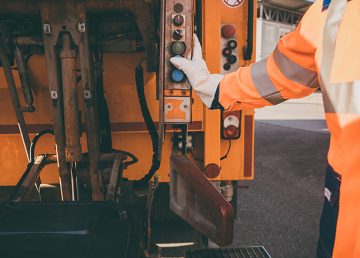

WASTE MANAGEMENT
Is the Waste Collection Industry ready for change?

Technology is arguably revolutionising every single industry, from modernising working practices with remote applications, to demonstrating productivity opportunities through new services. But, some industries are “behind the times” – the waste industry in particular.
eGovReview highlighted this back in 2021, stating “Digital transformation in the wastage industry is still in its nascent stages, and newer business models are expected to pop up in years to come. Every step in the waste management space could be digitalized, making digital transformation the need of the hour”.
Are waste collectors ready to play ball and get ahead of the curve? Who will win, and who will be left behind in this new era of waste management?
Customers want a sustainable service
Money makes the world go around, and customers are demanding a cost-effective and sustainable service that provides transparency, eliminates the cost of unnecessary collections, prevents waste build-up and contamination, and also reduces their Carbon Footprint.
It sounds like a lot of “asks” – but in reality, this is the bare minimum that the waste industry should be providing, especially if we look at how advanced other industries are.
Smart technology is all around us, take the energy sector as an example: energy companies that provide us with smart meters and more efficient ways of heating (or cooling) our homes dominate the market.
Customers feel like they are equipped with the right tools they need to save on costs, and from a sustainability perspective, they can see real-time the amount of energy they are using.
Energy companies that fail to provide this information simply won’t be the company of choice for the consumer, because they have a better (and more technologically advanced) option that is easier to use.
The same principles can be applied to waste management.
This is where sensors and an intuitive software platform come in
As a simple example, using bin sensors our platform can determine the fill level of a bin and its readiness for collection. Add to that a scheduling, routing and reporting capability for the bins and you can dramatically improve productivity for your collection service.
If a truck could automatically find the optimum route to collect only those bins that need collecting, how much saving in human capital and operations expenses could be made? With fuel prices and labour costs increasing globally, this is naturally going to become an important area for improvement to mitigate this. Equally, it’s just good practice to not waste budget on fuel and contribute to air pollution more than necessary.
What are the benefits?
A smart waste solution has the following benefits which solve the above challenges:
Digitize all waste processes from bin to truck to depot
Not only is it important to capture information about fill levels in a bin, but it’s also important to be able to automate all elements of the process from bin collection, to route planning and reporting.
A single platform is what’s needed to cater for all these needs. Our platform is centralised and easy to use, with full integration, saving you time.
Improve and expand service offering
While optimising routes and reducing collection frequencies may sound like bad news to waste collectors, the added service capability that data brings to the sector is where the real opportunity is.
What if your waste collector could help you with information to improve your own sustainability goals or pinpoint in a timely and accurate way the source of contamination of a bin?
Added-value services like this will enable waste collectors to charge more per collection and combined with improved productivity, will enhance the overall profitability of a waste collector.
And finally, happier citizens
Creating an environment that is clean and well-managed will undoubtedly positively influence the citizens that inhabit it.
Using smart waste management allows you to reduce pollution, and prevent the spread of disease. Studies have shown that unkempt places naturally make us feel uncomfortable and unsafe, so improving the environment in a city through smart waste management is one step closer to creating a better place for all.
A great example of a location that has adopted smart waste management tactics and is living proof of a happier and safer environment is Singapore.
Known for its rigorous rules around waste management, Singapore has used digital transformation across multiple elements of the city, enabling it to run efficiently and making it one of the safest and cleanest cities in the world, and arguably the safest place in Asia.
Your digital transformation needs to happen sooner rather than later
Although the waste management industry is still behind on digital transformation as a whole, now is the time to take action and put digitalization at the forefront of your waste management strategy.
To learn more about how we can help, visit our waste collector page here.